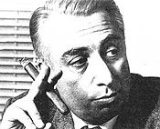
Roland Barthes
Overview
Roland Gérard Barthes (12 November 1915 – 25 March 1980) (ʁɔlɑ̃ baʁt) was a French
literary theorist
, philosopher, critic
, and semiotician
. Barthes' ideas explored a diverse range of fields and he influenced the development of schools of theory including structuralism
, semiotics
, existentialism
, social theory
, Marxism
, anthropology
and post-structuralism
.
Roland Barthes was born on 12 November 1915 in the town of Cherbourg
in Normandy
. He was the son of naval officer Louis Barthes, who was killed in a battle in the North Sea before his son was one year old.
France
The French Republic , The French Republic , The French Republic , (commonly known as France , is a unitary semi-presidential republic in Western Europe with several overseas territories and islands located on other continents and in the Indian, Pacific, and Atlantic oceans. Metropolitan France...
literary theorist
Literary theory
Literary theory in a strict sense is the systematic study of the nature of literature and of the methods for analyzing literature. However, literary scholarship since the 19th century often includes—in addition to, or even instead of literary theory in the strict sense—considerations of...
, philosopher, critic
Critic
A critic is anyone who expresses a value judgement. Informally, criticism is a common aspect of all human expression and need not necessarily imply skilled or accurate expressions of judgement. Critical judgements, good or bad, may be positive , negative , or balanced...
, and semiotician
Semiotics
Semiotics, also called semiotic studies or semiology, is the study of signs and sign processes , indication, designation, likeness, analogy, metaphor, symbolism, signification, and communication...
. Barthes' ideas explored a diverse range of fields and he influenced the development of schools of theory including structuralism
Structuralism
Structuralism originated in the structural linguistics of Ferdinand de Saussure and the subsequent Prague and Moscow schools of linguistics. Just as structural linguistics was facing serious challenges from the likes of Noam Chomsky and thus fading in importance in linguistics, structuralism...
, semiotics
Semiotics
Semiotics, also called semiotic studies or semiology, is the study of signs and sign processes , indication, designation, likeness, analogy, metaphor, symbolism, signification, and communication...
, existentialism
Existentialism
Existentialism is a term applied to a school of 19th- and 20th-century philosophers who, despite profound doctrinal differences, shared the belief that philosophical thinking begins with the human subject—not merely the thinking subject, but the acting, feeling, living human individual...
, social theory
Social theory
Social theories are theoretical frameworks which are used to study and interpret social phenomena within a particular school of thought. An essential tool used by social scientists, theories relate to historical debates over the most valid and reliable methodologies , as well as the primacy of...
, Marxism
Marxism
Marxism is an economic and sociopolitical worldview and method of socioeconomic inquiry that centers upon a materialist interpretation of history, a dialectical view of social change, and an analysis and critique of the development of capitalism. Marxism was pioneered in the early to mid 19th...
, anthropology
Anthropology
Anthropology is the study of humanity. It has origins in the humanities, the natural sciences, and the social sciences. The term "anthropology" is from the Greek anthrōpos , "man", understood to mean mankind or humanity, and -logia , "discourse" or "study", and was first used in 1501 by German...
and post-structuralism
Post-structuralism
Post-structuralism is a label formulated by American academics to denote the heterogeneous works of a series of French intellectuals who came to international prominence in the 1960s and '70s...
.
Roland Barthes was born on 12 November 1915 in the town of Cherbourg
Cherbourg-Octeville
-Main sights:* La Glacerie has a race track.* The Cité de la Mer is a large museum devoted to scientific and historical aspects of maritime subjects.* Cherbourg Basilica* Jardin botanique de la Roche Fauconnière, a private botanical garden.* Le Trident theatre...
in Normandy
Normandy
Normandy is a geographical region corresponding to the former Duchy of Normandy. It is in France.The continental territory covers 30,627 km² and forms the preponderant part of Normandy and roughly 5% of the territory of France. It is divided for administrative purposes into two régions:...
. He was the son of naval officer Louis Barthes, who was killed in a battle in the North Sea before his son was one year old.
Unanswered Questions

